News
Is AI Coming for Your Dev Job or Not? A Tale of Two Surveys
Will advanced AI robots replace professional software developers? Depends on who you ask.
The long-simmering issue was revisited following the recent unveiling of GitHub Copilot, an advanced AI system that acts like a "pair programmer" by suggesting whole-line code completions and much more. It revived existential angst among developers.
Possibly expecting such a reaction, GitHub CEO Nat Friedman himself addressed that angst straight away: "We think that software development is entering its third wave of productivity change. The first was the creation of tools like compilers, debuggers, garbage collectors, and languages that made developers more productive. The second was open source where a global community of developers came together to build on each other's work. The third revolution will be the use of AI in coding. The problems we spend our days solving may change. But there will always be problems for humans to solve."
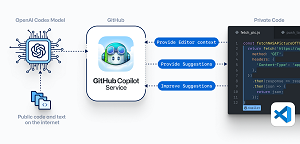 [Click on image for larger view.] GitHub Copilot (source: GitHub).
[Click on image for larger view.] GitHub Copilot (source: GitHub).
However, whatever job-stealing fears Friedman may have allayed might have been exacerbated with the subsequent news that GitHub Copilot's AI system, called Codex, had been improved by its creator, OpenAI, to the point that entire software projects can be created solely through typed (and soon voiced, probably) natural language commands. That means that, after telling Codex to build a web page, a developer could just say "Start a Python web server to serve that page" and see the requisite code spit out.
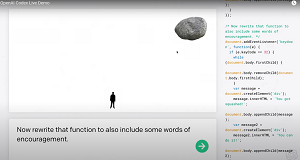 [Click on image for larger view.] Turning Words into Code (source: OpenAI).
[Click on image for larger view.] Turning Words into Code (source: OpenAI).
Not too long after that, MDBootstrap.com surveyed more than 500 web developers to find out more about their thoughts on the GitHub Copilot launch, AI risks to the job market in general and possible solutions. The company, specializing in web-dev tech like Bootstrap and Material Design, claims its MDB platform is used by more than 2 million developers and organizations to speed up web development.
The survey revealed that web developers do indeed fear for their jobs.
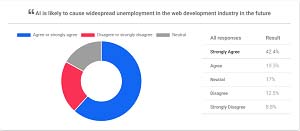 [Click on image for larger view.] 'Likely to Cause Widespread Unemployment' (source: MDBootstrap).
[Click on image for larger view.] 'Likely to Cause Widespread Unemployment' (source: MDBootstrap).
"AI is definitely coming for web development jobs," says the company's "Do web developers fear AI?" report. "A majority of web developers recognize that AI is a real threat when it comes to the job market. 61.7 percent agreed that AI is likely to cause widespread unemployment in the web development industry."
However, other surveys beg to differ.
"The 'robots are coming to take our jobs' fear is a myth," said Kryon, an enterprise automation technology firm, in announcing its own survey of office workers, as opposed to developers.
The company's "2021 Automation and the Future of Work Report" was published last month, based on a survey of 300 workers at companies ranging in size from 1,000 employees to more than 10,000 in the United States, European Union and Asia-Pacific.
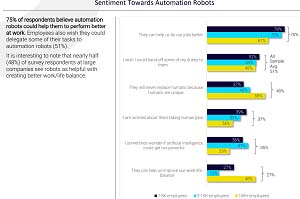 [Click on image for larger view.] 'They Will Never Replace Humans' (source: Kryon).
[Click on image for larger view.] 'They Will Never Replace Humans' (source: Kryon).
"Increased awareness of the benefits of workplace automation has negated much of the fear surrounding robots replacing humans," the Kryon report continues. "Employees now recognize the value of automating workflows as a support function that allows them to focus on more fulfilling and valuable tasks throughout the day. In fact, 46 percent look forward to saving time on repetitive tasks, while 39 percent see increased productivity as a primary advantage."
As the graphic above shows, 40 percent of respondents to the Kryon survey believe automation robots "will never replace humans because humans are unique" while 37 percent said "I am worried about them taking human jobs."
The MDB survey, meanwhile, shows that nearly 62 percent of respondents strongly agreed or just agreed with the statement "AI is likely to cause widespread unemployment in the web development industry in the future," while about 21 percent disagree or strongly disagree.
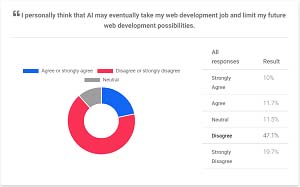 [Click on image for larger view.] 'What, Me Worry?' (source: MDBootstrap).
[Click on image for larger view.] 'What, Me Worry?' (source: MDBootstrap).
While that's a general question, when asked about their own jobs, respondents weren't so worried. "Surprisingly, despite admitting that AI will eventually be problematic for the industry as a whole, web developers are optimistic about their own employment situation," MDB said. "When asked if they personally think that AI may eventually take their own job and limit their future web development possibilities, a staggering majority of 66.8 percent disagreed."
They also aren't afraid to use GitHub Copilot, with about 65 respondents indicating they will do so in their work, while about 12 percent won't.
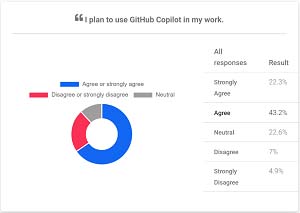 [Click on image for larger view.] 'I Plan to Use GitHub Copilot' (source: MDBootstrap).
[Click on image for larger view.] 'I Plan to Use GitHub Copilot' (source: MDBootstrap).
Summing up the results, MDB concluded that a typical web developer:
- Recognizes that AI will eventually replace most of the industry
- Despite that, he is confident that his own job is safe
- Plans to incorporate GitHub Copilot in his work
- Opposes government regulation regarding AI research
- Supports government aid for displaced workers
Conversely, in the automation-robots-are-good camp in which Kryon resides, highlights of its survey include:
- 32 percent of employees say more than half of their day is wasted on repetitive tasks
- Three-quarters of people recognize that automation can help them do their jobs better
- There is a lot of unrealized potential for automation across business functions
- 95 percent of people see potential for more automation in the workplace
- Nearly 80 percent of people are ready for their digital twin (a digital assistant who can take over their repetitive and mundane tasks)
The conflicting survey results shouldn't be too surprising, as inherent bias can be introduced in such surveys in myriad ways, and survey results often seem to be skewed depending on how much vendor "skin" is in the game. Also, possible bias notwithstanding, developers in general are split on the issue, with most seeming to think AI might be a job killer in the future but not anytime soon. For example, here's a smattering of developer comments that are all over the map, taken from a couple of discussion sites:
- *AI replaces the client*
- So this is why GitHub let developers host their code for free, to eventually replace them :(
- I am blown away but not scared for my job... yet. I suspect the AI is only as good as the training examples from Github. If so, then this AI will never generate novel algorithms. The AI is simply performing some really amazing pattern matching to suggest code based on other pieces of code. But over the coming decades AI could dominate coding. I now believe in my lifetime it will be possible for an AI to win almost all coding competitions!
- All this time we were using Github thinking "hey, this is neat and free", but didn't know that actually we were feeding the AI that will replace us all.
- While this is cool and I look forward to trying it, it's not going to replace software engineers. Even if it worked 100 percent correctly, it would be a tool for software engineers. There are still a ton of problems for engineers to solve - Architecture, maintenance, and increasingly, we're getting pulled into dev ops and data science roles.
- Tools like email, instant messenger, and online calendars made secretaries much more productive which increased demand for the skills. Wait... Replacement of programmers will follow these lines. New tools, like copilot (haven't tried, but will soon), new languages, libraries, better IDEs, stack overflows, Google, etc will make programming easier and more productive. One programmer will do the work that ten did. That a hundred did. You'll learn to become an effective programmer from a bootcamp (already possible - I know someone who went from bootcamp to Google), then from a few tutorials will. Just like the secretary's role in the office was replaced by everyone managing their own calendars and communications the programmer will be replaced by one or two tremendously productive folks and your average business person being able to generate enough code to get the job done.
- I mean it totally could replace our jobs, if the requirements were clear, the specifications were exact, and developers only wrote code. So no... it won't replace our jobs any time in the near future.
- We went through the same hype cycle with self driving cars. We are now ~15 years out from the DARPA challenges and to date exactly 0 drivers have been replaced by AI. It is certainly impressive to see how much the GPT models have improved. But the devil is in the last 10 percent. If you can create an AI that writes perfectly functional python code, but that same AI does not know how to upgrade an EC2 instance when the application starts hitting memory limits, then you haven't really replaced engineers, you have just given them more time to browse hacker news.
- Reading this thread it seems to me that AI is a threat for "boilerplate-heavy" programming like website frontends, I can't really imagine pre-singularity AI being able to replace a programmer in the general case. Helping devs go through "boring", repetitive code faster seems like a good way to increase our productivity and make us more valuable, not less. Sure, if AI evolves to the point where it reaches human-level coding abilities we're in trouble, but that's the case this is going to revolutionize humanity as a whole (for better or worse), not merely our little niche.
- No, programmers won't be replaced, we'll just add this to our toolbox. Every time our productivity increased we found new ways to spend it. There's no limit to our wants.
- It could start to replace us in 20 years. Or reduce. It is exciting for now
- The envelope of "programming" will continue to shift as things get more and more complex. Your mother-in-law is not going to install Copilot and start knocking out web apps. Tools like this allow programmers to become more productive, which increases demand for the skills.
Visual Studio Magazine readers don't seem too concerned, either. An informal, cursory examination of comments to various articles indicates this reader's thoughts sum up the attitude of many: "I'm in the developer business now for almost 45 years and first thing I heard in the 70s was that were gonna be replaced soon by computers. But every 'replacement' boosted our productivity in a way that the amount of programmers needed doubled every 5 years. So welcome to 'AI pair programmer 'which will guarantee that nothing of the above said changes!"
About the Author
David Ramel is an editor and writer at Converge 360.